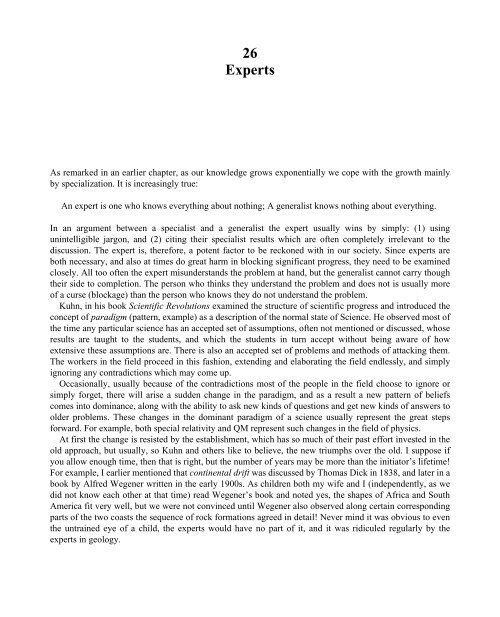hamming
hamming
hamming
You also want an ePaper? Increase the reach of your titles
YUMPU automatically turns print PDFs into web optimized ePapers that Google loves.
26ExpertsAs remarked in an earlier chapter, as our knowledge grows exponentially we cope with the growth mainlyby specialization. It is increasingly true:An expert is one who knows everything about nothing; A generalist knows nothing about everything.In an argument between a specialist and a generalist the expert usually wins by simply: (1) usingunintelligible jargon, and (2) citing their specialist results which are often completely irrelevant to thediscussion. The expert is, therefore, a potent factor to be reckoned with in our society. Since experts areboth necessary, and also at times do great harm in blocking significant progress, they need to be examinedclosely. All too often the expert misunderstands the problem at hand, but the generalist cannot carry thoughtheir side to completion. The person who thinks they understand the problem and does not is usually moreof a curse (blockage) than the person who knows they do not understand the problem.Kuhn, in his book Scientific Revolutions examined the structure of scientific progress and introduced theconcept of paradigm (pattern, example) as a description of the normal state of Science. He observed most ofthe time any particular science has an accepted set of assumptions, often not mentioned or discussed, whoseresults are taught to the students, and which the students in turn accept without being aware of howextensive these assumptions are. There is also an accepted set of problems and methods of attacking them.The workers in the field proceed in this fashion, extending and elaborating the field endlessly, and simplyignoring any contradictions which may come up.Occasionally, usually because of the contradictions most of the people in the field choose to ignore orsimply forget, there will arise a sudden change in the paradigm, and as a result a new pattern of beliefscomes into dominance, along with the ability to ask new kinds of questions and get new kinds of answers toolder problems. These changes in the dominant paradigm of a science usually represent the great stepsforward. For example, both special relativity and QM represent such changes in the field of physics.At first the change is resisted by the establishment, which has so much of their past effort invested in theold approach, but usually, so Kuhn and others like to believe, the new triumphs over the old. I suppose ifyou allow enough time, then that is right, but the number of years may be more than the initiator’s lifetime!For example, I earlier mentioned that continental drift was discussed by Thomas Dick in 1838, and later in abook by Alfred Wegener written in the early 1900s. As children both my wife and I (independently, as wedid not know each other at that time) read Wegener’s book and noted yes, the shapes of Africa and SouthAmerica fit very well, but we were not convinced until Wegener also observed along certain correspondingparts of the two coasts the sequence of rock formations agreed in detail! Never mind it was obvious to eventhe untrained eye of a child, the experts would have no part of it, and it was ridiculed regularly by theexperts in geology.


